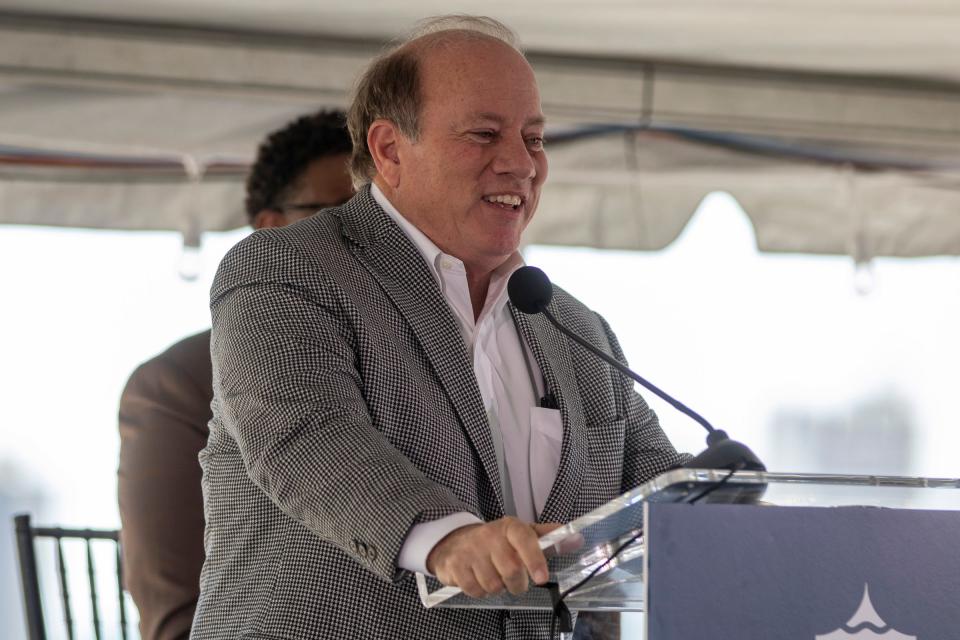Duggan's tax plan stalls in Michigan Legislature, but some see path forward
- Oops!Something went wrong.Please try again later.
Michigan legislation to enable a major overhaul of Detroit's property tax system — which burdens homeowners with some of the highest rates in the U.S. — stalled in the state House this week as Democrats withheld their support for the marquee tax plan from Detroit Mayor Mike Duggan.
The mayor unveiled his proposal earlier this year to levy a so-called "land value tax" in Michigan's biggest city that would pay for a property tax cut by raising taxes on vacant land. He wants city council to give Detroit voters the opportunity to approve his proposal. Proponents of Duggan's plan see it as a way to provide relief for residents, attract potential homebuyers and spur development by disincentivizing land speculation.
But to put his plan into action, Duggan first needs help from state lawmakers.
Some Republican lawmakers supported the Detroit land value tax legislation in an initial attempted vote Wednesday to kick off the process to allow Detroit to adopt the proposal. However, House Speaker Joe Tate, D-Detroit, who backs Duggan's plan, didn't find the votes he needed from fellow Democrats in Lansing.
More: Detroit's Charles H. Wright Museum gets $1.8M in federal funds for renovations
More: Students can get paid fellowships with Detroit mayor, city departments: How to apply
The legislation appeared on the state House agenda three times before lawmakers held their first vote Wednesday. The voting board remained open for just over an hour and a half without securing enough support to pass before the bill was pulled. It is unclear when the Democratically-controlled state House may put it up for a vote again.
Democratic lawmakers offered a range of explanations for why they didn't support the legislation in the initial vote attempt.
Some Democratic lawmakers cited concerns they said their Detroit constituents expressed about the tax plan. Those lawmakers said they needed more time to understand how the proposal would work. One sees Duggan's plan as a boon for large developers while another wants to see the proposal expanded beyond Detroit. Yet another doesn't have issues with the current proposal, pointing instead to party infighting over a slow start to the legislative session after the summer recess and concerns that Democratic leadership has fast-tracked Duggan's tax plan while other priorities seem to have lost momentum.
Tate named passing the legislation to allow Detroit to adopt a land value tax as one of his top priorities this fall. "This has been an idea and a concept I think that we've been talking about for a number of years," he told the Free Press last month.
Now he's considering the path forward and has no updated timeline on when the state House might revisit the legislation, according to Tate's spokesperson. Meanwhile, Mayor Duggan vowed to continue his fight in Lansing. "We will work harder to build more support and try again," the mayor said in a statement.
In a floor speech ahead of the vote Wednesday, state Rep. Dylan Wegela, D-Garden City, said that he sees the land value tax as potentially creating "a huge tax break for billionaire property developers." Both Detroit homeowners and owners of large commercial properties stand to see their taxes lowered under Duggan's proposal, but it's unclear what share of the tax cut would go to each.
One Democratic lawmaker who didn't vote on the legislation — state Rep. Jason Morgan, D-Ann Arbor — said he didn't want to vote against it but wanted to show solidarity with fellow Democratic lawmakers he said feel frustrated by inaction on their legislative priorities. "And we don't feel right moving some priorities ahead of others unless they're all moving together," he said.
"Ultimately, this is about something bigger than yesterday's vote," he told the Free Press on Thursday. He called it unfortunate that the land value tax found itself caught up in a broader conversation about Democratic priorities this fall.
Duggan kicked off the first legislative hearings on his proposed land value tax last month by telling lawmakers that this latest request from Detroit to pass the tax bills differs significantly from the kinds of legislative asks the city has made in the past.

"Over the years, there's been many times the city of Detroit has been up to this Legislature asking for help because they were in financial trouble," Duggan testified before the House Tax Policy Committee. "The city is growing and we're not here asking for you to give us anything. We're asking for the tools to fix something ourselves, because the high property tax rates are choking the city."
Some lawmakers who represent part of Detroit expressed reservations that Duggan's plan is the best way to deliver tax relief. State Rep. Veronica Paiz, D-Harper Woods, wouldn't have a chance to vote on a land value tax if it ultimately lands on the ballot in Detroit. But her district includes some neighborhoods on the city's east side and she wants to make sure the legislation opening the door to such a vote would benefit Detroiters.
"I've been really torn about this and I'm a person who really believes in municipal autonomy," she said. "Regardless of if I like it not — if I agree with it or not — I still think it needs to be good legislation."
Contact Clara Hendrickson: chendrickson@freepress.com or 313-296-5743. Follow her on X, previously called Twitter, @clarajanehen.
This article originally appeared on Detroit Free Press: Detroit tax plan from Duggan stalls in Michigan House

